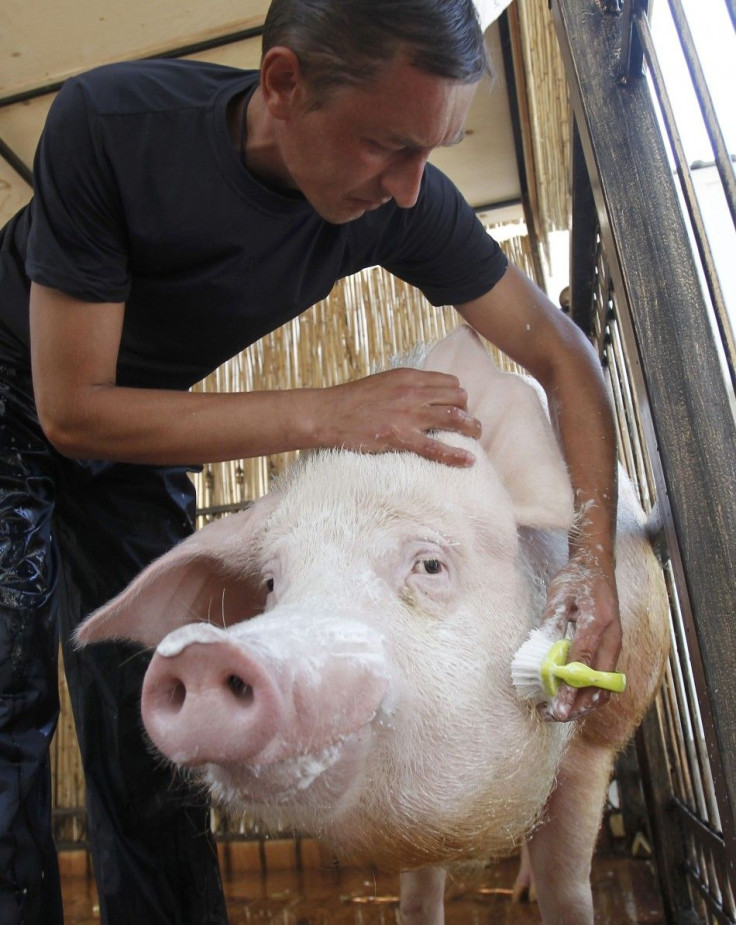Animal Rights Group Targets Wal-Mart Over Pig Suppliers

The treatment of swine in industrial food production in a society of consumers that demand price points as low as humanly -- if not humanely -- possible is a question that will linger, but companies that sell pork or use pork products have scrambled to cut off a public outcry.
On Wednesday, the animal rights organization Mercy for Animals released disturbing footage taken at a Minnesota pig plant as part of a campaign to get Wal-Mart Stores Inc. (WMT) to stop using suppliers of pork or pork products that have come from pig farms that use gestation crates that are used to keep pregnant sows separated from the general pig population of a factory farm.
The campaign underscores the power activists have to pressure companies to stop using inhumane suppliers.
Even though the video targets Wal Mart because it is the largest retail chain on the planet that has considerable sway over its suppliers, other companies have scrambled in recent months to avoid the sow-stall stigma.
On Tuesday, a day before the video was released, Issaquah, Wash.-based Costco Wholesale Corp. (Nasdaq:COST) sent a letter to Mercy for Animals that it has sent to all of its pork suppliers demanding they phase out gestation crates by 2022.
Costco's vice president of food safety, Craig Wilson, told The Associated Press that the timing of the letter was a coincidence and that the company had been mulling the issue for a while.
Bentonville, Ark.-based Wal-Mart also told the news service that it offers gestation-stall-free pork products in many of its stores and that it would find ways to increase the number of suppliers that don't use the stalls.
The footage from Christensen Farms, a major supplier of pork, includes pregnant sows in pens that greatly limit their movement, the images of sick or injured piglets being bashed against the floor to dispatch them and other scenes that would be disturbing to meat-eaters used to seeing their pigs in the form of rip tips carry-out or shrink-wrapped pork chops.
Confining mother pigs in such crates is so blatantly cruel that the practice has been banned by the entire European Union, New Zealand, and the states of Florida, Arizona, Oregon, Colorado, California, Maine, Michigan, and Rhode Island, said the group on its website.
In addition to that list of places where gestation stalls have been banned, here's a list of the companies that have in recent months made statements pledging to phase out any suppliers using these stalls, to avoid being targeted as indifferent to animal rights concerns: Safeway Inc. (NYSE: SWY) of Pleasanton, Calif.; The Kroger Co. (NYSE: KR) of Cincinnati, Ohio; Sears Holdings Corp. (Nasdaq: SHLD) of Hoffman Estates, Ill.; McDonald's Corp. (NYSE: MCD) of Oakbrook, Ill.; Burger King Holdings, Inc. (NYSE: BKC) of Miami; The Wendy's Co. (Nasdaq:WEN) of Dublin, Ohio; and Hardee's Food Systems Inc. of St. Louis, Mo.
For its part, Christensen Farms of Sleepy Eye, Minn., says its practices are industry accepted. Both the National Pork Producers Council and the Minnesota Pork Producers Association back the pig farm's claim that the treatment of the swine is not unusual.
Confined space is a common practice in factory farms, which are under immense market pressure to meet both high demand for meat consumption and the low and stable prices American consumer have come to expect.
© Copyright IBTimes 2024. All rights reserved.






















